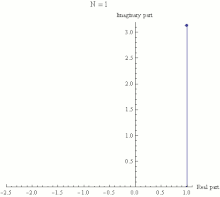There is another...........or it seems to me.........
Euler's identity
From Wikipedia, the free encyclopedia

The
exponential function ez can be defined as the
limit of
(1 + z/N)N, as
Napproaches infinity, and thus
eiπ is the limit of
(1 + iπ/N)N. In this animation
Ntakes various increasing values from 1 to 100. The computation of
(1 + iπ/N)N is displayed as the combined effect of
Nrepeated multiplications in the
complex plane, with the final point being the actual value of
(1 + iπ/N)N. It can be seen that as
N gets larger
(1 + iπ/N)Napproaches a limit of −1.
| Part of a series of articles on the |
| mathematical constant e |
|---|
 |
| Properties |
|---|
|
|
| Applications |
|---|
|
|
| Defining e |
|---|
|
|
| People |
|---|
|
|
| Related topics |
|---|
|
|
|
|
In mathematics,
Euler's identity[n 1] (also known as
Euler's equation) is the
equality
where
- e is Euler's number, the base of natural logarithms,
- i is the imaginary unit, which satisfies i2 = −1, and
- π is pi, the ratio of the circumference of a circle to its diameter.



No comments:
Post a Comment